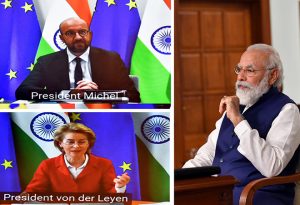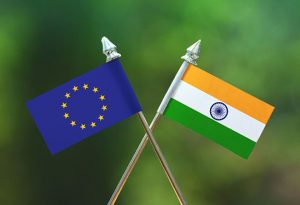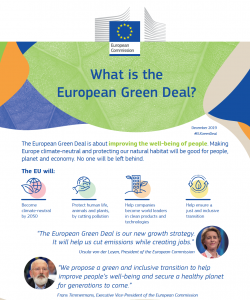
It seems to be the season of transformational diplomacy for India even as the world’s second most populous country battles a monstrous pandemic raging with ferocious intensity. Having raised the bar for its ties with the UK, India is now poised to transform its multifarious partnership with the 27-nation European Union at a defining digital summit on May 8, which will bring Prime Minister Narendra Modi and leaders of EU nations face to face virtually.
Prime Minister Narendra Modi was all set to go to Porto, Portugal, for the India-EU summit, but the deadly and destructive coronavirus decided otherwise. An in-person summit with EU leaders had to be cancelled due to a sharp spike in Covid-19 cases in India. Subsequently, the EU’s spontaneous assistance to India to mitigate the coronavirus pandemic has generated a lot of goodwill for the 27-nation bloc, also the largest trading partner of India.
Moving on, it promises to be a landmark summit in many ways – first and foremost, this will be the first India-EU summit, which will be held in 27+1 format. Sadly, due to its virtual format, all the hugs, handshakes, bonhomie and politicking among leaders will be missing, but in a despairing time the fact that 27 EU leaders have found time to have a summit with the Indian prime minister underscores that for all the bad press a Covid-battered India is getting in international news pages, the EU continues to bet on the India growth story.
Adversity sometimes brings the best in people and nations. And so it is with this India-EU summit, which is set to witness a series of transformational pacts and initiatives. The likely launch of FTA negotiations, which have been stalled since 2013, will be the high point of the May 8 digital summit. The much-delayed FTA negotiations, which have been embroiled in a thousand visions and revisions, are set to interlock the two growth poles of the world which together account for around $21 trillion GDP, in a sustained compact of trade, commerce and investment.
Connectivity Deal
The expected launch of the India-EU connectivity partnership will have a force multiplier effect on the economic and infrastructure partnership between the two sides. The connectivity partnership will involve building joint infrastructure projects in Asia, Europe and Africa with a view to provide a sustainable alternative to BRI projects. Projects undertaken under the India-EU partnership will encompass energy, digital and transport. The overarching objective will be to provide a paradigm of organizing connectivity and infrastructure development, which will be underpinned by transparency, financial sustainability and rule of law benchmarks, without imposing onerous debt burdens on recipient countries. The connectivity partnership is being touted as a joint India-EU plan for China containment, but the two sides are cautious not to project it as anti-Beijing mechanism.
Indo-Pacific Bonding

Strategically, the May 8 summit will be marked by a growing India-EU convergence on shaping an inclusive Indo-Pacific to promote a peaceful and prosperous region. The summit is taking days after the Councill of the European Union approved the EU’s Indo-Pacific policy entitled “EU Strategy for Cooperation in the Indo-Pacific — Council Conclusions.” This 10-page document, for the first time explicitly outlines the EU’s approach to the Indo-Pacific. The document highlights the reconfiguration of the EU’s Asia-Pacific approach to the Indo-Pacific in the light of rapidly changing geopolitical circumstances. EU countries like Germany, France, the Netherlands and Ireland have already articulated their Indo-Pacific strategy, but this is the first time the EU as a bloc has positioned the Indo-Pacific as a major foreign policy driver to promote the EU’s global and regional power aspirations.
The EU’s Indo-Pacific policy is set to open new avenues of structured cooperation between India and the EU on optimizing economic cooperation as well as developing coordination mechanisms for protecting and promoting rules-based order. India sees its evolving partnership with the EU in the Indo-Pacific as part of its multifaceted approach that includes plurilateral forums such as the Quad and trilaterals to moderate China’s assertiveness on the region, pointed out diplomats.
Green Deal

In the run-up to COP26 in Glasgow in November 2021, the discussions at the May 8 summit will focus a great deal on collaboration in green development and clean energy, Indian and EU officials said. One can expect the two sides to launch an action plan to implement the EU-India Clean Energy and Climate Partnership that was agreed at the last India-EU digital summit in July 2020.
The EU green deal has opened new opportunities for India-EU partnership in spurring green growth and clean energy. The green and digital transition, according to EU’s Ambassador to India Ugo Astuto, are twin priorities for both the EU and India.
Above all, the May 18 summit will raise the bar for enhancing India-EU coordination on a host of geopolitical and cross-cutting issues between the two normative powers dedicated to shielding democracy and rules-based international order from unilateral adventurism. The transformational ripple effects of major decisions taken at the May 18 summit will be felt in months and years to come.
Author Profile

- Manish Chand is Founder and Editor-in-Chief of India Writes Network (www.indiawrites.org) and India and World, a pioneering magazine focused on international affairs. He is CEO, Centre for Global India Insights, an India-based think tank focused on global affairs.
Latest entries
 India and the WorldFebruary 17, 2026South-by-South: Focus on people-centric solutions at India AI summit
India and the WorldFebruary 17, 2026South-by-South: Focus on people-centric solutions at India AI summit India and the WorldFebruary 7, 2026Modi hails interim India-US trade deal, Goyal says no concessions made on agriculture
India and the WorldFebruary 7, 2026Modi hails interim India-US trade deal, Goyal says no concessions made on agriculture India and the WorldFebruary 2, 2026Trump announces trade deal with India, Modi ‘delighted’
India and the WorldFebruary 2, 2026Trump announces trade deal with India, Modi ‘delighted’ India and the WorldJanuary 31, 2026Palestinian minister bats for mediatory role for India in ending Gaza conflict
India and the WorldJanuary 31, 2026Palestinian minister bats for mediatory role for India in ending Gaza conflict








